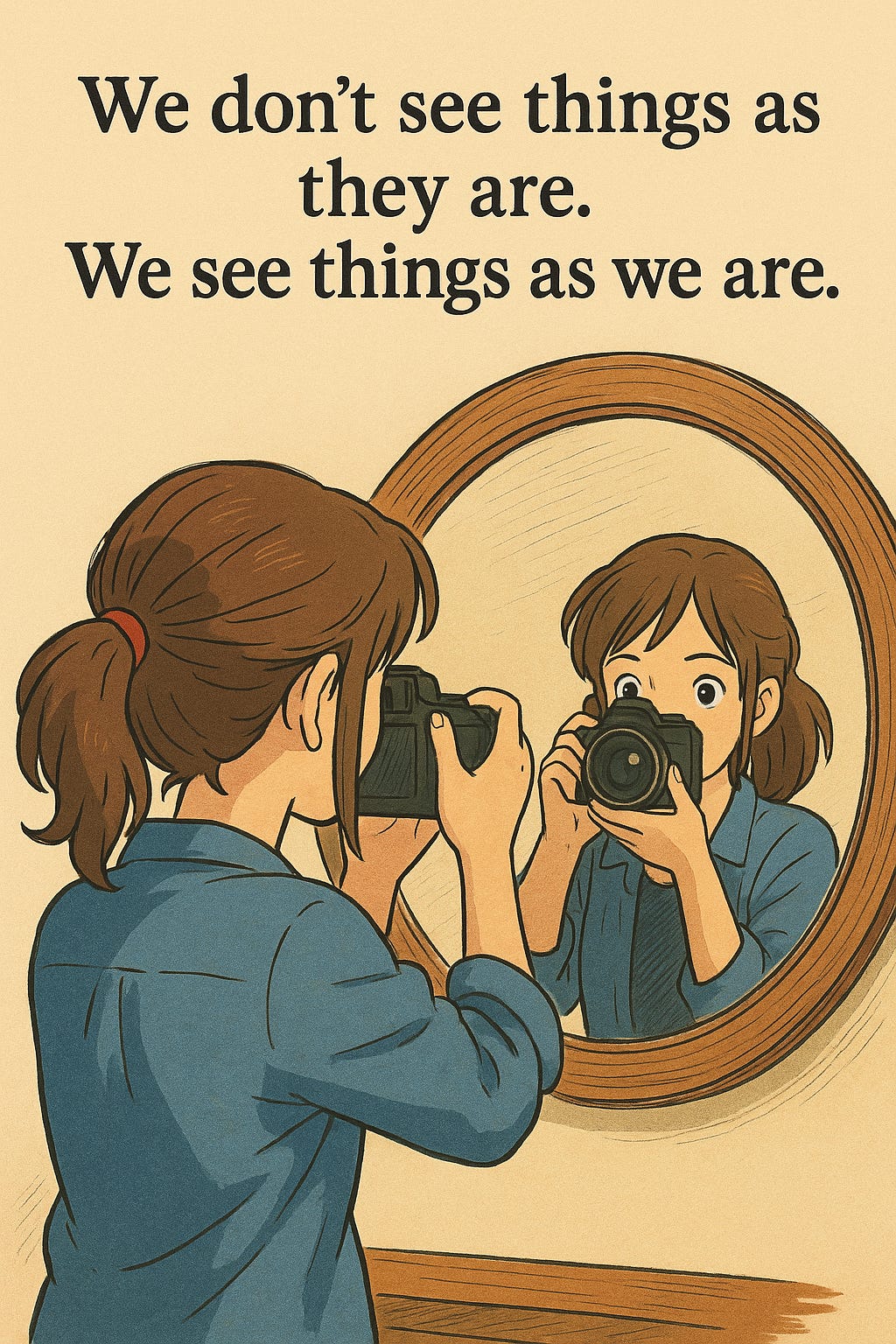Deep Reflection: The Looking Glass is Not Passive #CreativeWriting
A Philosophical confession.

✒️ What if every truth we see is a myth we silently co-create?
There is a quote that lingers in both classrooms and quiet moments of doubt:
"We don't see things as they are. We see things as we are."
It appears modest, even aphoristic. Yet beneath its simplicity lies a seismic truth about consciousness. The reflective surface, it turns out, is never just a tool. It is a threshold. A myth. A trap. A seduction.
In a well-known visual metaphor, a woman stands with a camera before a glass witness. She captures what she thinks is the world. In fact, she documents herself, infinitely. Reflection becomes recursion. Vision becomes self-reference. Meaning loops back into the subject. This image is not just a photograph. It is a philosophical confession.
The Looking Glass and the Myth
In myth, reflective portals have long been dangerous. Narcissus drowns in his own reflection. Perseus must use a polished shield to look at Medusa without being turned to stone. Snow White's queen consults her enchanted speculum to confirm her status, eventually consumed by the threat of a younger reflection.
Each of these myths encodes a warning. When the image becomes too powerful, it distorts identity and drives the seer toward obsession, paralysis, or illusion.
So why do we still trust what we see?
Psychoanalysis and the Shattered Self
Jacques Lacan theorised that our sense of self emerges from a mirror stage. This is the moment in infancy when we first identify with our reflection. But what we see is not our real, fragmented self. It is a fiction of coherence. An idealised image. This misrecognition becomes the blueprint of the ego. From that point forward, we seek in the external world a completeness we never truly possess.
The looking glass gives us a mask and tells us it is a face.
From a Lacanian perspective, all seeing is loaded with unconscious desire. We project our fears, ideals, and traumas onto the world and call the result "reality." But what we experience is not the thing itself. It is an echo of what we already carry.
The reflective surface does not reflect. It seduces.
Glass Witnesses in the Digital Age
In the modern world, reflecting planes are no longer made of glass. They are made of algorithms and feeds, of surveillance and segmentation. These echo chambers show us not who we are but what the system wants us to desire. We scroll through simulacra of self-curated lives, filtered images, quantified selves. And we begin to mistake the virtual mask for the internal voice.
Even our leadership models fall prey to this distortion. We reward those who project certainty, coherence, and narrative. Yet behind the curated persona may lie fragmentation, doubt, and an overidentified ideal self. As hollow as the image Narcissus once loved.
The Existential Lens
This brings us to the most uncomfortable idea of all.
If every perception is shaped by projection, then every truth is co-authored.
There is no such thing as unfiltered experience. Only stories we tell ourselves about what we see.
Which brings forth a series of quieter questions.
What if clarity is not about perfect vision, but about understanding the limits of sight?
What if self-awareness is not found in the image, but in the shadow it cannot reveal?
True insight, then, is not just to look. It is to interrogate the lens.
To become aware not of the world's shape, but of the eye that sees it.
And to accept that the world will never be flat, factual, or finished.
It will always be refracted. Always arriving through the secret mythologies of the self.
A Gentle Invitation
As the reflection deepens, one might ponder.
Are you seeing the world as it is, or merely tracing the outlines of your self-image within it?
In a culture that rewards reaction, the greatest resistance may be to pause. To perceive slowly. To ask: What myth is my perception serving?
Is it the story of control? Of longing? Of fear? Of hope?
True innovation begins not with invention. It begins with interruption. A moment when the polished surface opens just enough to glimpse the unseen.
—#CreativeWriting— by Ellis Zeitmann for ThinkZeit
#DeepReflections #InkOfTheDay #CreativeWriting #MirrorStage #JacquesLacan #MythologyAndMeaning #ExistentialThinking #Psychoanalysis #CulturalCritique #Leadership #NarrativeIdentity #CreativeThinking


